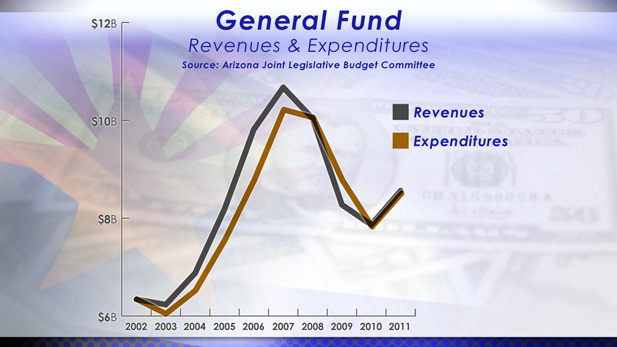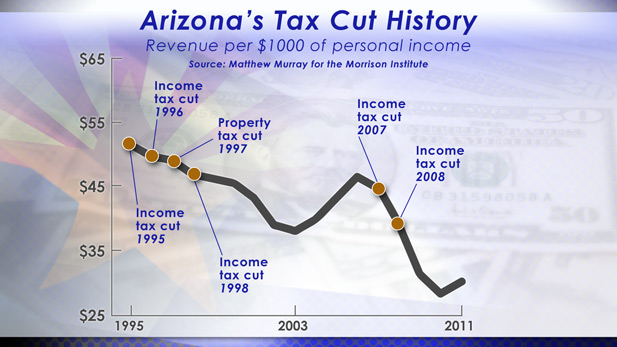Gov. Jan Brewer’s 2012 budget proposal, filled with major cuts to programs far and wide, will be painful for nearly all Arizonans, two experts on state policy and budgeting say.
Kristin Borns, senior policy analyst for the Morrison Institute for Public Policy at Arizona State University, and Byron Schlomach, an economist and director of the Goldwater Institute’s Center for Economic Prosperity, made their assessments in interviews in Phoenix.
“Obviously, it’s painful,” Schlomach said. “It’s very, very painful to have to tell people we are going to have to radically change how we do business in this state.”
Borns agreed: “Realistically, we have cut almost as far as we can cut. And to really position Arizona strategically … we have to make sure any cuts we make are strategic and are thoughtful.”
The two had differing assessments on the direction Brewer’s budget takes. The proposal covers what her office estimates to be a $763 million deficit for the current fiscal year, ending in June, and another $1.15 billion for the next fiscal year.
“It really is a tentative solution at best, and there’s no balance in the options,” Borns said. “It’s a cuts-based budget alone.“
“I think there are some things in it that we can commend. She’s certainly doing her best to avoid tax increases. She came out with some recommendations for restructuring taxes that are workable,” Schlomach said.
The two also disagreed over whether Brewer’s proposal deals with what is called the state’s structural deficit. That is the change over the last 15 years in the state’s tax structure, with tax rates for income and property going down steadily, without matching changes in the structures of programs and their expenses.
 Historical data shows Arizona's revenues and expenditures haven't kept pace over the past three years.
Historical data shows Arizona's revenues and expenditures haven't kept pace over the past three years.
Borns said she would prefer seeing more balance. “Any sort of budget solution for the long term needs to balance cuts and revenue,” she said.
Schlomach said lower tax rates are good, and he is happy to see them in Arizona. At the same time, he said the state needs an overhaul of its tax system, with the goal being lower taxes that help stimulate business growth and hence growing state revenues.
 Steadily declining income taxes have compounded the imbalance between what the state takes in and what it spends.
Steadily declining income taxes have compounded the imbalance between what the state takes in and what it spends.
The two agreed that Brewer’s attempt to cover nearly half of next year’s budget deficit by seeking to cut Arizona’s Medicaid health care program for the poor is a gamble.
Brewer got the Legislature to approve her asking the federal government for a waiver from rules requiring the state to keep in place its current health-care levels. Tightened eligibility rules would cut 280,000 poor adults from state-supported health care and save $542 million in the state budget.
“It’s important to know, that cut would save according to the governor’s budget about $542 million. The flip side to that is the federal government provides a match to that, and we would lose an additional $1.1 billion,” Borns said.
Watch Arizona Week

By submitting your comments, you hereby give AZPM the right to post your comments and potentially use them in any other form of media operated by this institution.